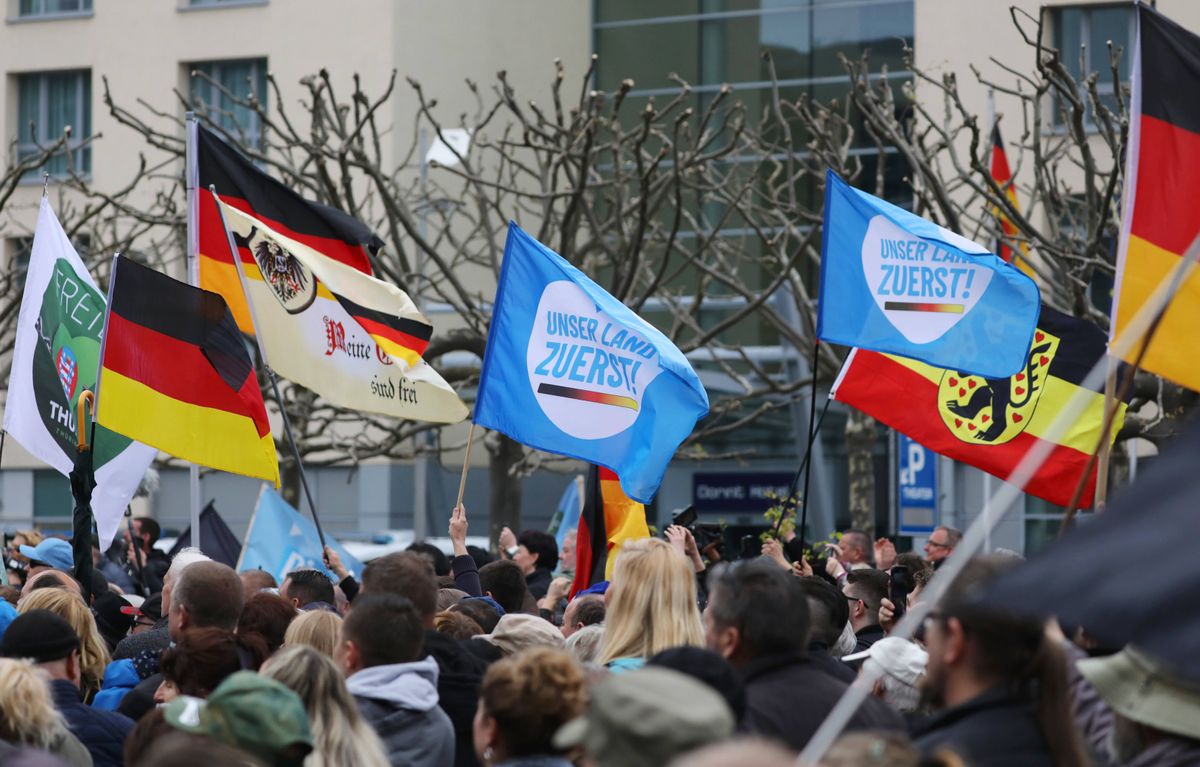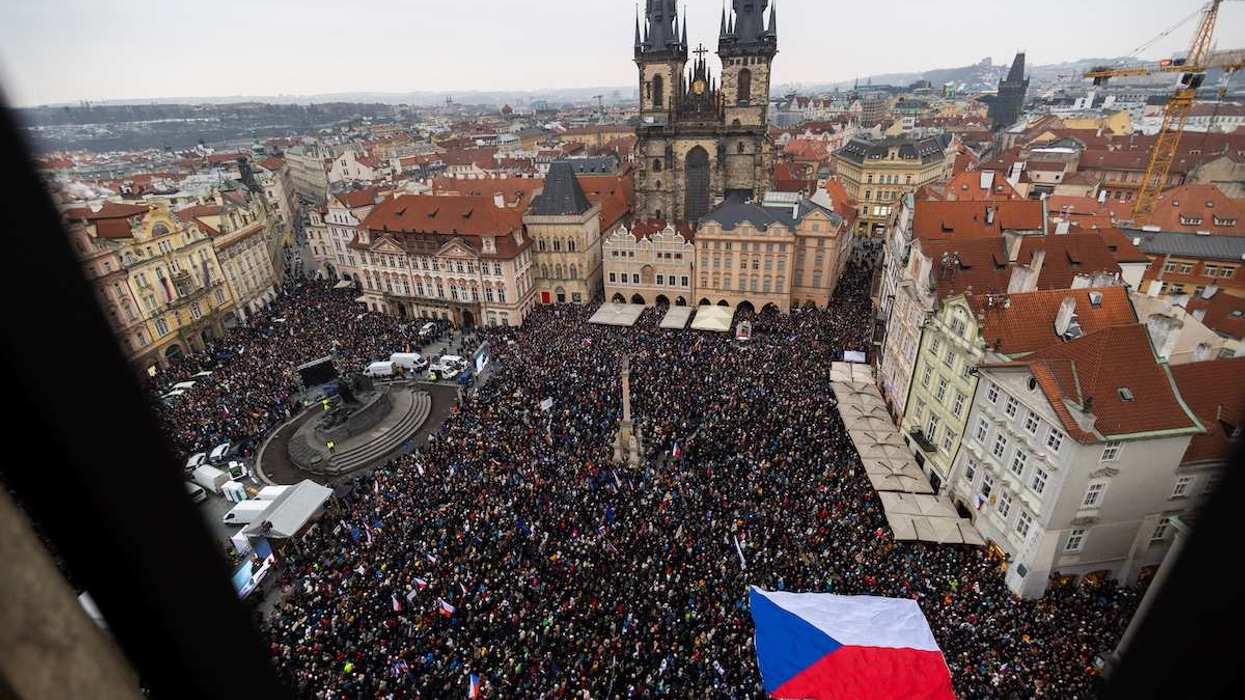For extremely obvious reasons, it’s always a little unsettling when the far-right is having a good moment in German politics.
That’s exactly what’s happening now as the avowedly anti-immigrant and Euroskeptic Alternative for Deutschland Party, known as AfD, is now neck-and-neck with the Social Democrats, the party of Chancellor Olaf Scholz. The AfD, which is polling at 19% (to the SPD’s 20%), is closing in on becoming the country’s second most popular political faction. The Christian Democratic Union Party still holds the top spot at 27%.
What explains AfD’s recent upward trajectory, and what does it tell us about the state of German politics 18 months after former Chancellor Angela Merkel left the stage, ending 16 years at the helm?
AfD’s raison d'être. Founded in 2013, the group’s main shtick at the time was agitating against the European Union’s planned bailout of indebted countries after the eurozone crisis. The founders wanted to ditch the single market and bring back the German Deutschmark. (Spoiler: It didn’t happen.)
But when millions of refugees starting streaming into Germany in 2015 in the aftermath of the Syrian civil war, the AfD morphed into an anti-immigrant – and anti-Islam – party and has since called for the German constitution to gut the right to seek asylum.
Evoking outrage has been par for the course for AfD party stalwarts, and in some instances, it’s perhaps the entire point. Consider that the AfD leader of the central state of Thuringia has called for Holocaust memorials to be taken down, while former party leader Frauke Petry once said that refugees should be prevented from crossing into Germany … by using armed force.
It’s in former East Germany – where grievances about economic inequality and second-class citizenship have festered since the end of the Cold War – that AfD’s populist, ethnocentric messaging has gained the most traction.
Still, when Germans last went to the polls in Sept. 2021, AfD was polling at around 10% on average, and the far-right group is now reaping nearly double that at 19%, having seen a four-point bump over the past 12 weeks alone.
“This is not a blip, and not some sort of short-term thing,” says Jan Techau, Germany director at Eurasia Group and former speechwriter to German Defense Minister Boris Pistorius. “We've seen buildup over some time, and now it seems like AfD is solidifying.”
So what explains this seismic shift?
Economic misery and the blame game. Anti-establishment parties almost always get a boost when the economy is hurting. Stubbornly high inflation over the past year – in large part due to the war in Ukraine – has provided an opening for the AfD’s populist message to resonate not only with the extremist right but also with disillusioned conservatives and those opposed to the status quo.
Indeed, although inflation has begun to ease, food prices are still up 15% year-on-year, an enormous strain for working-class Germans.
What’s more, that economic instability has coincided with a rise in asylum-seekers trying to reach the European Union this year by boat – from South Asia, the Middle East, and Africa – has presented the perfect boogeyman for populists and nativists across the bloc, including in Germany.
Consider that in the first four months of this year, initial asylum applications in Germany increased by 78% compared to the same period in 2022. This is in addition to the more than 1 million Ukrainians who’ve crossed into Germany since the war began, though these migrants don’t engender the same national scorn.
While public support for arming Ukraine is at 57%, AfD’s recent rise in popularity suggests that its argument that sanctions against Russia hurt Germany’s economic interests is resonating with at least some voters.
Many AfD backers are “disenfranchised conservatives who see no other alternative because they feel the mainstream conservatives have become too liberal” and aren’t responsive to their bread-and-butter needs, Techau says.
The traffic light turns green. The German coalition government that came into office in 2021 is a varied one. The three-party coalition, the first in Germany’s modern history, includes Scholz’s SPD, the progressive, climate-conscious Greens, and the business-friendly fiscal hawks of the Free Democratic Party. The coalition is known as the “traffic light” owing to the colors of its three members.
With the Greens heading the economy portfolio, climate reform has been at the forefront of the government's domestic agenda, even more so since Russia invaded Ukraine and the EU made a collective pledge to kick its Russian natural gas habit.
Accordingly, the government has sought to slow the use of oil and gas heating systems by 2024, mandating that new heating systems are powered by at least 65% of renewable sources. The government's push to install heat pumps in homes and offices – a very expensive undertaking – has resulted in a massive pushback that the AfD has naturally used to its advantage. (AfD parliamentary leader Alice Weidel has called the government plan a “heating massacre.”)
Techau says that failure to sell this policy to voters has perhaps been the government’s biggest downfall. “When they started to legislate, they were quite ambitious and weren't able to explain it in a way that convinced people,” he says, adding that “people started to react quite negatively to this.”
Extremism abhors a power vacuum. The departure of Merkel after almost two decades at the top left a pair of sensible brogues that no successor has been able to fill. While her CDU/CSU remains the most popular, its support has certainly been slipping since 2020. As a result, some conservatives susceptible to economic populism have been lost to the AfD in recent months.
Tachau says the fact that current CDU leader Friedrich Merz is very unpopular has been a boon for AfD. “He’s not seen as a possible future chancellor, and that means that a good number of voters will go elsewhere,” he says.
This dynamic is exacerbated by the fact that Scholz’s SPD never had that much of an edge to begin with – winning just 10 more seats than the CDU in 2021. Perceptions of Scholz as unable to control infighting with his coalition over how to roll out domestic policies have only added fuel to the fire.
“The ideological leanings and the clumsy craftsmanship of Scholz's coalition, especially on migration and energy, have massively aggravated the situation,” Techau says, adding that while “they are not to be blamed alone, as much of the anger is structural and has built up over a long time, the coalition's performance over the last 18 months made the whole situation boil over.”
Could AfD really rule? All of Germany’s major political parties have committed to putting up a Brandmauer – a firewall – between them and the AfD, meaning that they have agreed not to sit with the formerly fringe group in any governing coalition. But if the far-right party gets more and more popular, could that change by the next election?
For now, Techau doesn’t think so. “In Germany, the ghosts of the past are always quite present,” he says.
However, even though the AfD could be kept out of a government by other major parties forming a broad (and unstable) coalition, that too would only feed into the AfD’s narrative of ostracization and otherness.
Indeed, such a move “would only turn into a shallow mechanism to keep them out,” Techau says. His takeaway? “No matter which way you do it, you're doing it wrong.”



















